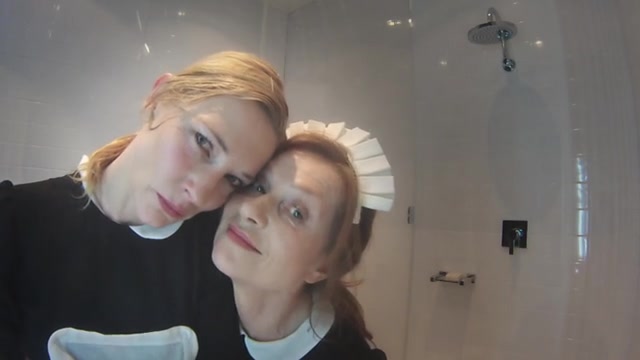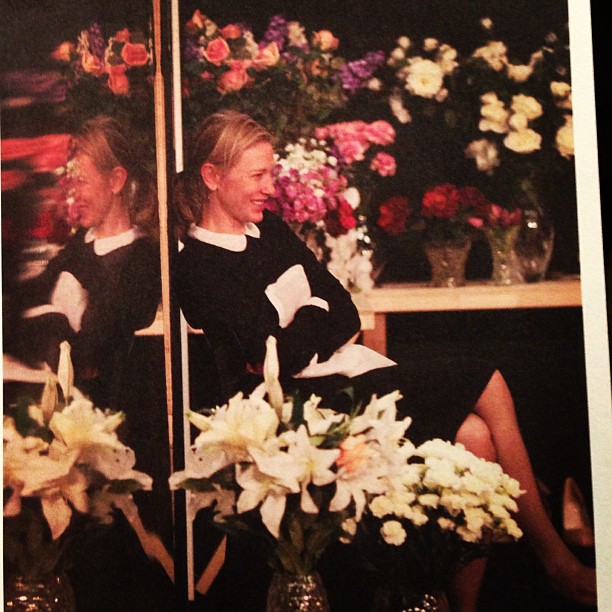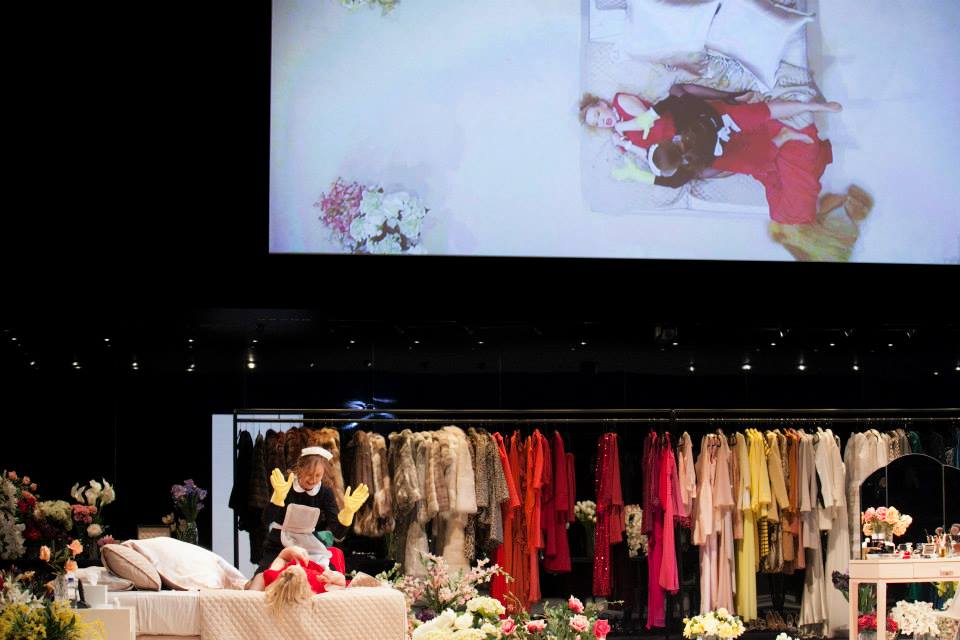
Cate Blanchett as: Claire
Directed by: Benedict Andrews
Adapted by: New translation by Andrew Upton and Benedict Andrews (Play by Jean Genet)
Play run: 4 June – 2 July 2013
Venue: Roslyn Packer Theatre at Sydney Theatre Company
* The play had its New York transfer in 2014.
Photos | Videos
Genet loosely based his tale on the true story of the Papin sisters, maids convicted of killing their employer. His version of the tale depicts a series of sadomasochistic rituals in which housemaids Solange and Claire fantasise about killing their madame while – naturally – dressing up in her outfits.
Who better to realise this uncanny scenario than director Benedict Andrews – recently acclaimed here and in Europe for his lean and insightful production of Gross und Klein (Big and Small).
And as the maids? None other than Cate Blanchett and French screen legend Isabelle Huppert.
Cast:
Cate Blanchett as Claire
Isabelle Huppert as Solange
Elizabeth Debicki as Mistress
Creatives:
Set and costume design by Alice Babidge
Lighting design by Nick Schlieper
Music by Oren Ambarchi
Video design by Sean Bacon
Sound design by Luke Smiles
Related Images
View more images at the gallery.


- “As human beings we constantly jockey for status, no matter what our race, social position or gender may be. There is, of course, a class struggle within the maids, between the maids and their mistress and master, but even between the two underdogs — Claire and Solange — there is a rampant, ever-changing power dynamic. The cut and thrust of that has been a thrilling challenge to take on.” (Playbill, August 2014)
- “The play had long been on [Benedict] and Andrew’s radar and Isabelle and I were looking for a project we could work on together, and the play seemed to speak to all of us.”
- “It’s an elliptical, labyrinthine play, and we’re exploring the ellipsis in the play, so we’re sisters in an abstract sense. That’s just the outer surface of the play, there to be played with. We talked at one point about swapping roles. We also talked about whether, at a certain point, we might fall into French. We played around with those things and with those concepts, but ultimately we decided not to pursue them. It’s a bit like throwing mud on the wall and seeing what sticks. Those ideas didn’t stick.” (Observer, August 2014)
- On the new translation by Benedict Andrews and Andrew Upton: “It’s wonderful to work with Benedict and Andrew’s adaptation. They’ve really gone for the degraded, baroque side of the language as well as the banal, prosaic side of the language. Lots of words I wouldn’t say in front of my grandmother. But lots of grandmothers came to the play and loved it.” (New York Times, July 2014)
- On Isabelle Huppert: “[Isabelle Huppert is] very playful but fearless as a performer, and of ferocious intelligence” (The Australian, June 2013)
- On the big screen projecting some of actions in the play: “It makes the experience quite democratic. The audience’s eye is constantly being directed between the fetishlike shots that are happening on the screen and the live action on the stage.” (IN New York, August 2014)
Quotes from Others
- Benedict Andrews
— On the play touching themes of colonisation: “The emotions of the maids – the love, the hate, the oppression – are those felt by colonised people for those who colonised them. Genet was attracted to outsiders and people who were fighting for their freedom and that idea is still very much in the play.
Then there is his depiction of incestuous love, two sisters who masturbate each other at night and tell each other stories, the closeness of that. That’s much more fascinating than anything else… The play deals with the problem of their love, a very bruised, closed-in love. It’s a love that only belongs to them up in their little attic where they have two poor cots, a statue of the Virgin Mary and their little stories. That’s their life and it’s very, very tangled: who’s betraying who and what to do with this knot of their love.”
— On Cate Blanchett and Isabelle Huppert: “What is common to both of them is kind of a relentless pursuit of truth. They don’t want to just be part of something easy or obvious. They want to be part of things that are kind of pushing the boundaries and pushing them.”
— On Elizabeth Debicki: “Elizabeth is an astonishing talent. The real deal. It’s a treat to watch her share the stage with Cate and Isabelle – two of the greatest living stage actresses. I love watching her soak it all in and learning on her feet. She’s commanding, seemingly fearless, hyper-inventive, deliciously playful and fiercely intelligent.”
— On the play: “What remains shocking is the emotional hunger of these two women. The only way they can deal with the ways that they are held down, treated as scum, is to invent a murderous erotic fantasy.” - Isabelle Huppert:
— “When you’re onstage, it’s like the creation of a new world. You need to take this complete freedom and explore the immensity of possibilities. Cate [Blanchett] and I were completely in tune with that. We had a lot of pleasure pushing the maids’ craziness as far as we wanted. It was an infinite playground for us. I wish we could have done it longer.”
— On the new translation by Benedict Andrews and Andrew Upton: “This adaptation really brings the play to a space that maybe I would not experience in French. It makes it profane and more contemporary, rough.”
— On having Madame played by a younger actress: “It’s a brilliant idea. It’s never been done before. It makes it even more cruel. Madame has the power of youth.” - Elizabeth Debicki:
— “‘Surreal’ is my buzzword in my life (at the moment). It’s an accurate way to describe it. It’s very strange when you meet somebody that you’re admired for so long you are a bit in awe of that person. I definitely was, and I still am everyday as I watch them work. And I did spend the first few days feeling quite – not out of my depth because nobody made me feel that – but I was sitting there pinching myself. I kept looking at Cate and Isabelle because I’d watched their films forever. I’d met Cate in person before when I came to talk about the play with her and Andrew. That was surreal. We had a cup of coffee and it was like, ‘I’m having coffee with Cate Blanchett.’ But I’d never met Isabelle and I’ve loved her work for so long so to be actually working with her is kind of electric. I still can’t believe it when we are playing the scene together that I have the honour of working with someone with that talent.”
Selected Reviews
Excerpts from selected reviews.
- Canberra Critics Circle — “It would be easy to say the performances of Cate Blanchett, Isabelle Huppert and Elizabeth Debicki go without saying. But that would only be because their extraordinary command of their voices seemed to come so easily. It takes a little while to catch the details in Huppert’s French-accented English, but the new translation leaves no doubt about Solange’s meaning. Huppert creates a delightful, at times almost whimsical character, and therefore all the more tragic in the end. Blanchett’s Claire was exquisite – a character as demanding of her sister as the Mistress is of Claire. I could say these two were as I expected, considering the last performance I saw by Blanchett in Uncle Vanya and Huppert’s films over the years, but Debicki’s Mistress was an equal to her more experienced colleagues’ quality.”
- ArtsHub — “As the play begins, Claire (Blanchett) and Solange (Huppert) – Genet’s versions of the Papins – are in the midst of a frequently performed ritual. In a macabre version of girls playing dress-ups, Claire is impersonating her mistress, sending forth a torrent of abuse towards Solange who grovels on the floor before her, while pretending to be Claire. It’s a sadomasochistic ritual that teeters seductively on the edge of murder until an alarm rings and the maids return to being mere maids once again.
After such a build-up by Blanchett – who uses her imperious queenliness to full affect – the arrival of the actual Mistress could have been fraught with disappointment. But young up and coming star Elizabeth Debicki can more than hold her own in this illustrious company. As the spoilt, unhinged and emotionally abusive Mistress she shines in the sick light of this play. The brilliantly garish set by designer Alice Babidge clearly belongs to her, as do the maids. Once she is gone, it is no surprise that they remain trapped in a room dripping with her personality, with only one exit.” - TheaterMania — “All three women play into the cinematic style with theatrical gusto, wildly gesturing and expectorating (often on each other). Blanchett, in particular, has a flair for dramatic mugging. She speaks with a deadly serious tone while grotesquely curling her eyelashes in the mirror. Of course, Claire is playing a role in this moment: that of her employer. Her character study is so detailed and spot-on. In a fairer world, Claire would be an actress rather than a maid.
Debicki enters the play midway, looking very much like Paris Hilton with her chunky glasses and garish fur. Her endless bloviating about her undying love for her man, accented by the occasional emotional outburst, has all the hallmarks of borderline personality disorder. She’s an ideal candidate for that popular manifestation of our voyeuristic tendencies: reality TV. While Blanchett and Debicki seem to be acting in a melodrama, Huppert is in a slapstick comedy. Crucially, she provides the comedic anchor for this very funny play. Her cartoonish physicality and happy-go-lucky line readings are hilarious. Blanchett and Debicki’s tragic melancholy is made all the more ridiculous by comparison. You can’t escape the sense that everyone is playing a role, propped up by delusions of grandeur and a grasp on reality that slipped away eons ago.
Andrews and Upton have gone for the jugular with their translation, eschewing the academic and literal for something that feels far more like a punch in the gut. It’s also largely unprintable. Still, the fundamental theme — the power of pretend to influence our real lives — feels all the more prescient in 2014. This play has aged very well.” - Vulture — “In order “to eliminate nature,” the maids (and Mistress, too) were meant to be played by adolescent boys. To my mind, Blanchett and Huppert eliminate nature just fine, even in their women’s bodies. The acting style is extreme to the point of expressionism, inviting us to laugh sourly at their (and our) attempt to find meaning in it. Both actresses play with accents: Huppert almost incomprehensible (though always quite legible) with her soupy French English; Blanchett like a radio tuning variously to Cockney, Aussie, Received Theatrical Round Tones, and Joan Crawford. The other contrasts between them are also beautifully calibrated. Whereas Huppert’s Solange skips and flounces and sings little ditties, humping herself during their sex games like a yippy lapdog, Blanchett’s Claire affects a grander tragic mien, somehow forcing real emotion through the various wrinkles of the play’s built-in anti-realism. When one is high the other is low; together they make one psychopath.”
- New York Times — “Ms. Blanchett portrays Claire, the younger and (marginally) meeker of the two title characters, who with her sister, Solange (Ms. Huppert), regularly acts out the fantasy ritual of murdering their rich and gorgeous employer, known only as Mistress, played by Ms. Debicki. (On this night, Claire gets to be Mistress, while Solange portrays Claire.) In doing so, Ms. Blanchett would seem to deploy every theatrical tool that she has at her command, though I suspect she still holds a few in reserve to surprise us the next time we see her.
Within minutes — no, seconds — she switches from the tones and postures of self-effacing servility to raging aristocratic arrogance, from little-girl passivity to assaultive sexuality. She truly contains multitudes. The wonder is that we believe every one of these self-contradicting displays, even though we know that Claire and the actress playing her are just, uh, acting. And she forces us to the uneasy conclusion that acting may be all there is in life.
That may also be implicit in the performance of Ms. Huppert, one of the French screen’s most fearless and incisive stars. But it’s hard to make that assessment, given that her thick accent renders her unintelligible for much of the time. Her scrappy, fierce Solange is a whirling dervish of acrobatic energy, for sure. She matches Ms. Blanchett’s Claire in her intense, whiplash physicality but not in tonal variety. Ms. Huppert also tends to mime her lines with fervent comic exaggeration, suggesting a visitor from the Planet French Music Hall. Is there any way that Solange and Claire could really be sisters? And is it possible that their Mistress, no matter how socially myopic she is, could ever confuse one with the other?
Ms. Debicki, who is in her early 20s, looks pretty much the same, which is ravishingly unlined. And you see the ingenuity in Mr. Andrews’s casting the Mistress as a spoiled debutante type rather than the usual middle-aged society matron. Excess, after all, is an accessory that looks attractive only on the young. This Mistress can still get away with changing her attitudes and emotions the way she changes clothes. Once she makes her entrance more than halfway through the play, you see how precisely Claire has been imitating her. Such exact mimicry makes both women seem pathetic, but especially Claire, because she’s now too old for that part.
That Ms. Debicki sometimes resembles the Cate Blanchett of 20 years ago makes the parallels all the more disturbing. And the double act they perform toward the end of the production’s uninterrupted 115 minutes makes you uncomfortable in ways I imagine might have pleased Genet, who was notoriously hard to please.”
Trivia & Facts
- The play had its limited run in New York from 6 to 16 August 2014 as part Lincoln Center Festival.
- Cate Blanchett won her fourth Helpmann Awards for Best Actress in a Play, she has previously won best actress awards for three other STC shows: Gross und Klein (2011), Uncle Vanya (2011) and Hedda Gabler (2004 & 2006).
- Elizabeth Debicki was nominated for Best Supporting Actress in a Play at 2014 Helpmann Awards.
- Cate Blanchett and Isabelle Huppert would embrace each other before they go onstage every night to emphasize that the sisters [their characters] deeply love and need other.
- Benedict Andrews and Cate Blanchett worked together in The War of the Roses (2009) and Gross und Klein (Big and Small) (2011-2012) prior to this play.
- In Rake (2014), Cate Blanchett cameoed in a scene with Elizabeth Debicki and Aden Young who both worked with her in the theatre, Debicki in The Maids (2013-14) and Young in Hedda Gabler (2004 & 2006).

 Welcome to Cate Blanchett Fan, your prime resource for all things Cate Blanchett. Here you'll find all the latest news, pictures and information. You may know the Academy Award Winner from movies such as Elizabeth, Blue Jasmine, Carol, The Aviator, Lord of The Rings, Thor: Ragnarok, among many others. We hope you enjoy your stay and have fun!
Welcome to Cate Blanchett Fan, your prime resource for all things Cate Blanchett. Here you'll find all the latest news, pictures and information. You may know the Academy Award Winner from movies such as Elizabeth, Blue Jasmine, Carol, The Aviator, Lord of The Rings, Thor: Ragnarok, among many others. We hope you enjoy your stay and have fun! 
 A Manual for Cleaning Women (202?)
A Manual for Cleaning Women (202?) The Seagull (2025)
The Seagull (2025) Bozo Over Roses (2025)
Bozo Over Roses (2025) Black Bag (2025)
Black Bag (2025)  Father Mother Brother Sister (2025)
Father Mother Brother Sister (2025)  Disclaimer (2024)
Disclaimer (2024)  Rumours (2024)
Rumours (2024)  Borderlands (2024)
Borderlands (2024)  The New Boy (2023)
The New Boy (2023) 











